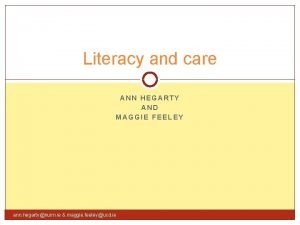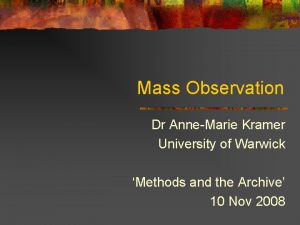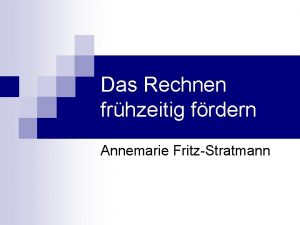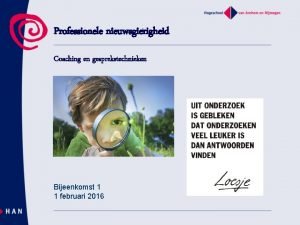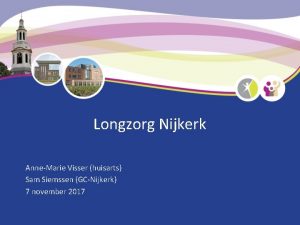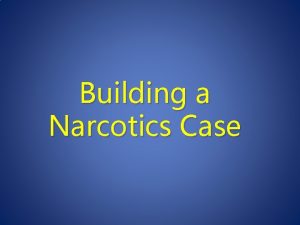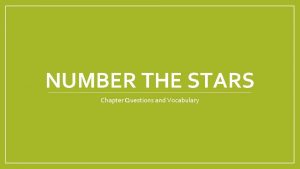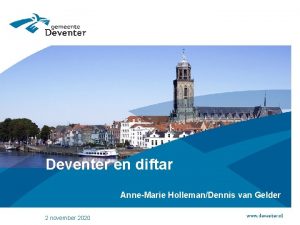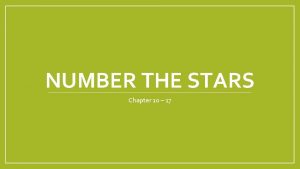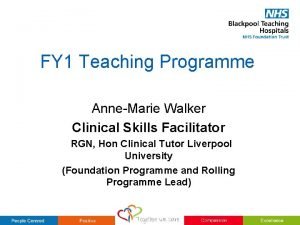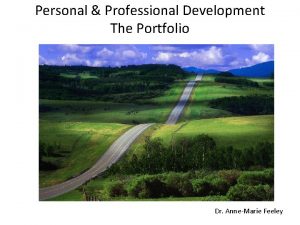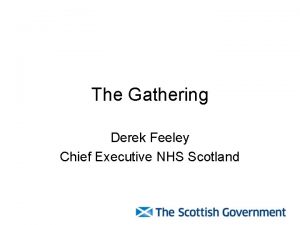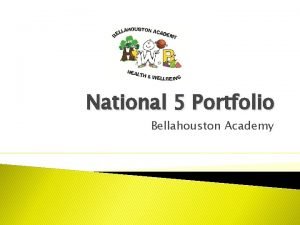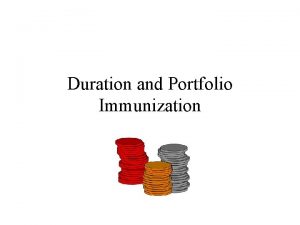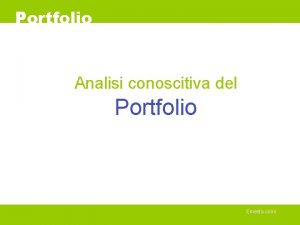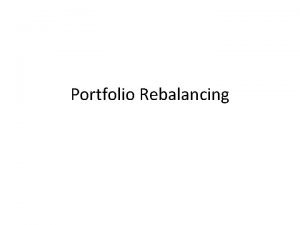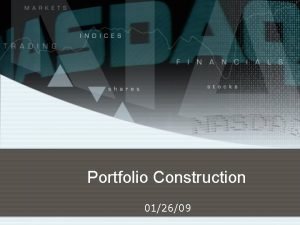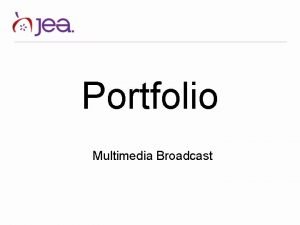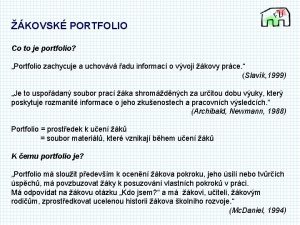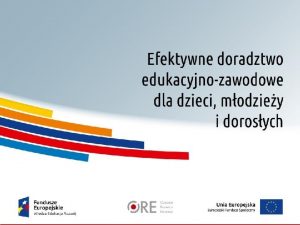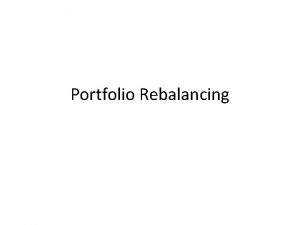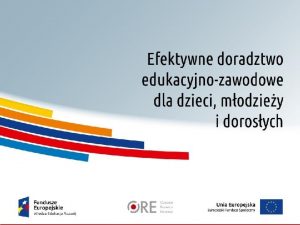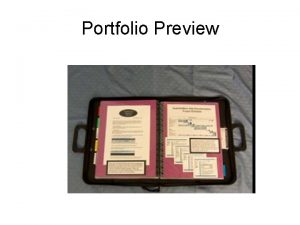The portfolio during AC 1 Dr AnneMarie Feeley

























- Slides: 25

The portfolio during AC 1 Dr. Anne-Marie Feeley, a-m. feeley@warwick. ac. uk

P O R T F O L I O Personal Learning Clinical/Professional Requirements Preparation for the clinical world Phase I (II/III) Phase II (I/III) Phase III (I/II)

Why portfolios? Why reflection? • Portfolios can drive clinical learning • They result in enhanced feedback from supervisors • Belcher et al (2014) BMC Medical Education • Reflection results in… – – Enhanced self-awareness Better knowledge and understanding Better integration of theory with practice 91% of students find them useful (if supported) • (Buckley et al, 2009) • Writing things down increases your memory of IMPORTANT facts and experiences – Kalnikait & Whittaker (2007) http: //diuf. unifr. ch/people/lalanned/Me. Mos 07/files/kalnikaite. pdf

Reflection, via learning, can expand the mind…. • … and protect against later dementia • Those who continue learning new things throughout life and challenging their brains are less likely to develop Alzheimer’s. • Activities involving multiple tasks or requiring communication, interaction, and organization offer the greatest protection. – Learn something new. Study a foreign language, learn sign language, practice a musical instrument, read the newspaper or a good book, or take up a new hobby. The greater the novelty and challenge, the larger the deposit in your brain reserves. – Practice the 5 W’s. Observe and report like a crime detective. Keep a “Who, What, Where, When, and Why” list of your daily experiences. – Follow the road less traveled. Take a new route, eat with your nondominant hand, rearrange your computer file system. Vary your habits regularly to create new brain pathways.

What makes for an effective portfolio? • • Structured Supported Integrated into the curriculum Assessed • (Driessen, 2003)

Aim Phase I Personal development Lectures/ Group work ‘Right to sit’ assignments -Learning to learn -Reflection: learning from the patient -Study & exam skills -Organisation & project management skills -Reflection: review of learning outcomes -Reflection: ‘most important thing I’ve learned this year’ -Wellbeing -Mindfulness -Teamwork Everyone can write a satisfactory reflection, using professional language

Basic Portfolio skills: which did we do in phase I? • Collection of material • Selection of appropriate material to include/present • Reflection • Projection (thinking into the future, about one’s needs and development) • Presentation (sharing with peers and tutors) • (Cited in Di. Biase, 2002)

Strengths in reflecting: phase I students • • Honesty Strong desire to identify areas for improvement Able to express feelings Ability to seek solutions Can identify strengths as well as weaknesses Take time to do it well Look at things from a variety of viewpoints Make achievable goals

Phase II Aim Lectures/Group work ‘Right to sit’ assignments AC 1 Moving toward the clinical world AC 1: -Human cognition & errors -Dealing with feelings -Dealing with uncertainty and change -Careers & life goals -Learning to use the eportfolio -Situational judgement dilemmas with your clinical personal tutor ‘Mastery’ quiz: getting to know ‘Good Medical Practice’ CCE The clinical world Foundation-like learning portfolio -Block 1: History and exam -Block 2: Investigations and differential diagnosis -Block 3: Principles of management Each block: -2 case-based discussions -2 long cases -2 mini-cases -Engagement with the team -Engagement with learning -Professional behaviour -Attendance

Situational judgement dilemmas • You’ve met these already in phase I, and will again during phase II • 2 types of question: – Ranking question – ‘list in order of appropriateness’ – Multiple choice – ‘pick the 3 best options from the list’ • Based on what you SHOULD do as a doctor (not what you WOULD do)

Situational judgement: a key decider of foundation training places • Foundation training places are prioritised according to the following formula: • 50 points: Situational judgement test – 70 questions, each question scores 0. 7 points • 50 points: Education performance – 34 – 43 points: performance in medical degree – 0 -5 points: other degrees – – – 1 point: 3 rd class honours degree 2 points: 2. 2 honours degree 3 points: 2. 1 honours degree 4 points: 1 st class degree or masters 5 points: Ph. D – 0 -2 points: publications (1 for each publication)

Learning about Good Medical Practice & Professional Communication • Themes – Professional written & verbal communication – Confidentiality – Consent – Doctors’ use of Social Media – Maintaining a professional boundary between you and you patient – Personal beliefs and medical practice – Protecting children and young people – Raising and acting on concerns about patient safety

Let’s try the ‘Good Medical Practice’ quiz now… • I hope you will do the quiz multiple times • The quiz covers the content suggested in your AC 1 workbook – Professional communication as a medical student – GMC guidance on protecting children, confidentiality, consent, professional boundaries, social media, patient safety, and personal beliefs and medical practice • I hope you will get (some) answers wrong – And learn by finding out WHY

True/False: If my mother is a general practitioner, there is no need for me to register with a general practitioner outside my family.

In a review of the most recent 60 cases of GMC fitness to practice hearings… • 4 involved prescribing for people other than your patients • 2 doctors received suspensions

True/false: it is your duty to investigate possible cases of child abuse

Which of the following are three cornerstones of a valid consent? • • • 1. Capacity 2. Ability to retain information 3. Freedom from coercion 4. Adequate information 5. Consent

Is this an example of effective feedback? • ‘Spelling mistakes in presentation list and feedback forms – unprofessional’

A small group of students approached a tutor and said: ‘Homosexuality does not exist in our community, therefore we would like to be excused from the mandatory group session on this topic’ Rank the options below in order of appropriateness • 1. Allow the students to be excused. • 2. Do not allow the students to be excused, but take no further action. • 3. Allow the students to be excused, but warn them that they won’t be able to act like this when they are doctors. • 4. Do not allow the students to be excused, and send them the GMC guidance on personal beliefs and medical practice. • 5. Meet the students, explore their beliefs and ideas, and explain to them, with reference to Good Medical Practice guidelines, why they cannot be excused from the session.

A small group of students approached a tutor and said: ‘Homosexuality does not exist in our community, therefore we would like to be excused from the mandatory group session on this topic’ Rank the options below in order of appropriateness • 5. Meet the students, explore their beliefs and ideas, and explain to them, with reference to Good Medical Practice guidelines, why they cannot be excused from the session. • 4. Do not allow the students to be excused, and send them the GMC guidance on personal beliefs and medical practice. • 2. Do not allow the students to be excused, but take no further action. • 3. Allow the students to be excused, but warn them that they won’t be able to act like this when they are doctors. • 1. Allow the students to be excused.

The learning portfolio in CCE • You are entering increasingly entering the clinical world, and your portfolio is becoming more like a foundation year portfolio. • Aims of the learning portfolio in CCE: • To drive learning – To help you record and reflect on your learning • To drive feedback – To help you ask for and get feedback from patients, peers and staff • To integrate the use of a portfolio into your training – To prepare you for foundation training as a doctor

Elements of the portfolio • • • Reflective log Meetings with supervisors/tutors OSLERs (long cases with feedback) Mini CEX (short clinical cases with feedback) Case Based Discussions with feedback Feedback on your professionalism and engagement

A student hears a rumour that the ‘end of block’ meeting and form are optional. What should he do? Please rank the following options from MOST appropriate to LEAST appropriate. • A. He should believe the rumour and relax about end of block requirements • B. He should read the information provided in his learning logbook about the requirements • C. He should ask other students if the rumour is true • D. He should contact the CCE lead to check the requirements • E. He should contact the CCE lead to let him know about the rumour so that a message can be sent out to all students clarifying the requirements

A student hears a rumour that the ‘end of block’ meeting and form are optional. What should he do? Please rank the following options from MOST appropriate to LEAST appropriate. • B. He should read the information provided in his learning logbook about the requirements • D. He should contact the CCE lead to check the requirements • E. He should contact the CCE lead to let him know about the rumour so that a message can be sent out to all students clarifying the requirements • C. He should ask other students if the rumour is true • A. He should believe the rumour and relax about end of block requirements • Ans: B best, D/E or E/D equally good next, C next, A last

Summary: my advice to you • Become familiar with ‘Good Medical Practice’ guidelines • Start to build up a file of situational judgement dilemmas, referencing ‘Good Medical Practice’ and other GMC documents regularly • Once you get to CCE, ‘prime yourself to ask loads of questions, get feedback…’ • You’ll be glad you did…
 Maggie feeley
Maggie feeley Annemarie kramer
Annemarie kramer Protoquantitative schemata
Protoquantitative schemata Technische voraussetzungen intranet
Technische voraussetzungen intranet Annemarie westerbeek
Annemarie westerbeek Anne-marie visser
Anne-marie visser Annemarie braun
Annemarie braun Annemarie leunissen
Annemarie leunissen Number the stars chapter 18
Number the stars chapter 18 Annemarie holleman
Annemarie holleman Annemarie nicholson
Annemarie nicholson Number of the stars chapter 10
Number of the stars chapter 10 Annemarie walker
Annemarie walker Personal values statement examples for students
Personal values statement examples for students Tư thế worm breton
Tư thế worm breton ưu thế lai là gì
ưu thế lai là gì Thẻ vin
Thẻ vin Cái miệng xinh xinh thế chỉ nói điều hay thôi
Cái miệng xinh xinh thế chỉ nói điều hay thôi Các châu lục và đại dương trên thế giới
Các châu lục và đại dương trên thế giới Từ ngữ thể hiện lòng nhân hậu
Từ ngữ thể hiện lòng nhân hậu Bổ thể
Bổ thể Tư thế ngồi viết
Tư thế ngồi viết Diễn thế sinh thái là
Diễn thế sinh thái là Thế nào là giọng cùng tên?
Thế nào là giọng cùng tên? Làm thế nào để 102-1=99
Làm thế nào để 102-1=99 Thơ thất ngôn tứ tuyệt đường luật
Thơ thất ngôn tứ tuyệt đường luật
